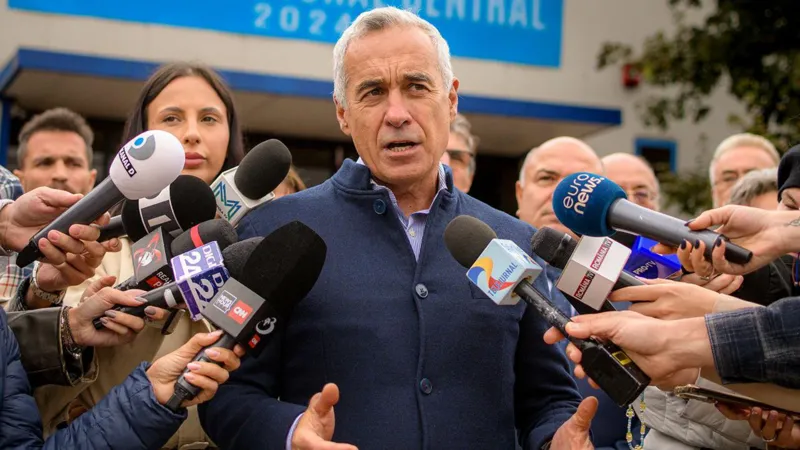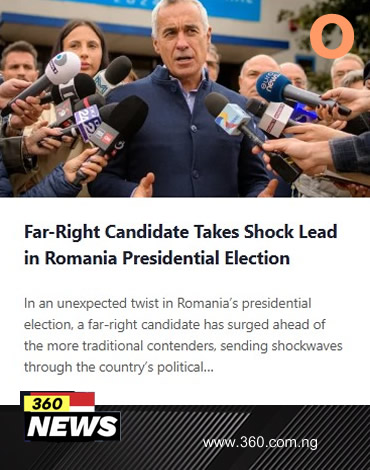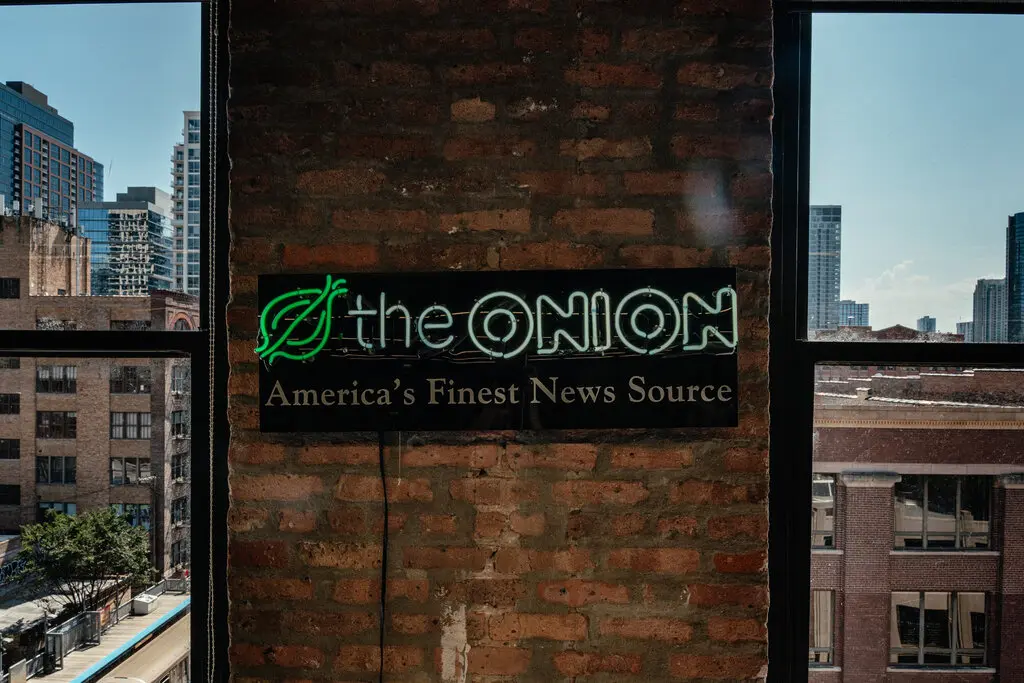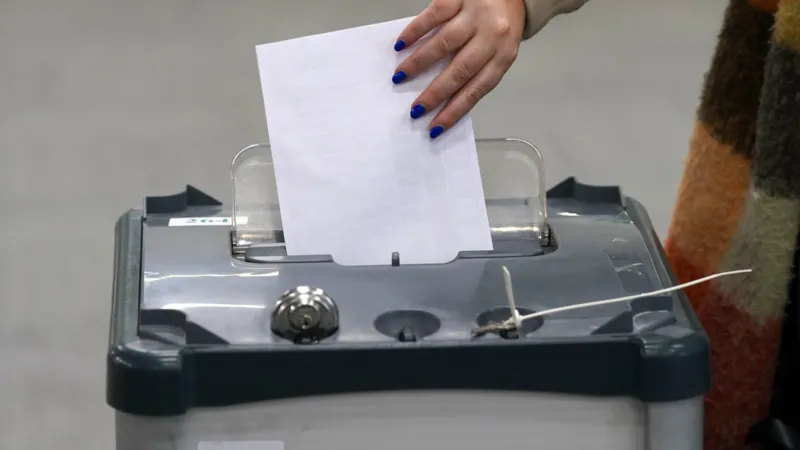Far-Right Candidate Takes Shock Lead in Romania Presidential Election

In an unexpected twist in Romania’s presidential election, a far-right candidate has surged ahead of the more traditional contenders, sending shockwaves through the country’s political landscape.
The emergence of this candidate as a frontrunner has raised concerns both domestically and internationally, as political analysts and voters alike attempt to understand the potential implications of such a dramatic shift.
The candidate, whose campaign has focused on nationalism, anti-immigration rhetoric, and a return to traditional values, has managed to capture the attention of a significant portion of the electorate.
Polls conducted in the lead-up to the election had suggested a tight race, with the incumbent president and several other candidates from established political parties leading the field.
However, the far-right contender’s rise has turned the race upside down, positioning them as a serious threat to the more moderate candidates, including those from the ruling party.
A Shock to the Political Establishment
The surge of the far-right candidate comes amid growing frustration among many Romanians with the political establishment.
For years, Romania has grappled with issues like corruption, economic inequality, and a sense of disillusionment with the political elites.
Many voters, especially in rural areas, feel that traditional parties have failed to deliver on their promises of economic prosperity and social stability.
In this context, the far-right candidate has capitalized on widespread dissatisfaction by offering a bold and populist agenda.
They have emphasized issues such as border security, national identity, and the protection of traditional Romanian culture, positioning themselves as a strong alternative to the status quo.
The candidate’s rhetoric has resonated particularly with younger voters and those frustrated with the slow pace of change in Romania’s political system.
Nationalism and Populism on the Rise
Nationalism has been a recurring theme in many European elections in recent years, and Romania is no exception. The far-right candidate has framed their campaign as a defense of Romanian sovereignty against what they see as external threats, including immigration and globalism.
Their focus on protecting local jobs and industries, as well as ensuring national security, has struck a chord with voters who fear the loss of traditional values in an increasingly globalized world.
The candidate has also made immigration a central issue in their platform, advocating for stricter border controls and policies aimed at reducing the number of refugees and migrants entering Romania.
This hardline stance has earned them support from those who view immigration as a threat to the country’s cultural integrity and economic stability.
Populist rhetoric has further fueled the candidate’s rise, with promises to combat corruption, dismantle political elites, and prioritize the needs of ordinary Romanians over the interests of powerful corporations or foreign entities.
This anti-establishment narrative has resonated with a significant segment of the population, particularly those who feel left behind by Romania’s integration into the European Union and the broader global economy.
Challenges and Controversies
Despite their rising popularity, the far-right candidate’s campaign has been marred by controversy. Critics have pointed to the candidate’s extremist views and rhetoric, accusing them of stoking division and undermining Romania’s democratic institutions.
They argue that the candidate’s platform could lead to increased social unrest and alienation, particularly among minority groups, including the Romani population and immigrants.
The candidate has also been criticized for their ties to ultra-nationalist groups and individuals with questionable track records on human rights.
Their use of inflammatory language, particularly regarding ethnic and religious minorities, has raised concerns among those who fear that their election could lead to a rise in hate speech and discrimination in Romania.
International observers have also expressed unease over the candidate’s stance on Romania’s place within the European Union.
The far-right contender has advocated for a more isolationist approach, suggesting that Romania should focus more on its interests and less on the EU’s policies.
This has raised questions about the future of Romania’s relationship with the EU and its ability to maintain access to European funding and support.
As the election approaches, the far-right candidate’s rising popularity has shifted the focus of the race. Mainstream parties are now scrambling to adjust their strategies and appeal to voters who may be tempted by the populist message.
The incumbent president, who has positioned themselves as a defender of Romania’s EU membership and a proponent of progressive values, faces a difficult challenge in confronting the surge of far-right sentiment.
In the coming weeks, the race will likely intensify, with both sides attempting to rally their bases and sway undecided voters.
For the far-right candidate, the challenge will be to maintain the momentum they have gained, while fending off attacks from opponents who seek to discredit their policies and ideology.
Meanwhile, the more moderate candidates will need to demonstrate that they can address the concerns of disaffected voters without resorting to the same divisive tactics.
The outcome of this election could have far-reaching consequences for Romania’s future, particularly in terms of its political direction, its relationship with the European Union, and its role on the global stage.
If the far-right candidate secures a victory, it could signal a shift towards more nationalistic and isolationist policies, not just in Romania but across the broader European continent.
On the other hand, a defeat for the far-right could serve as a reaffirmation of Romania’s commitment to democratic values, European integration, and a more inclusive political environment.
The rise of the far-right candidate in Romania’s presidential election marks a significant turning point in the country’s political landscape.
With their populist rhetoric and nationalist agenda, they have managed to tap into a deep vein of dissatisfaction among voters, propelling themselves to the forefront of the race.
However, their controversial views and ties to extremist groups have raised alarms about the potential consequences of their success.
As the election heats up, all eyes will be on Romania to see whether the country will embrace this new political direction or reject it in favor of a more moderate path forward.
Picture News







